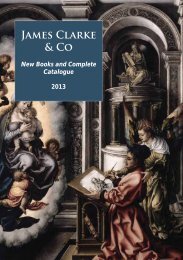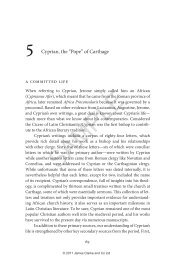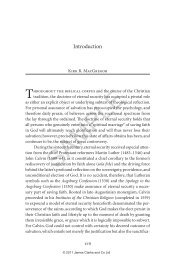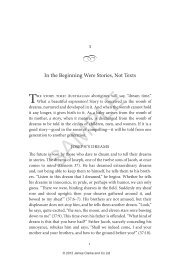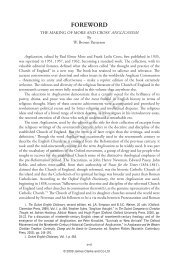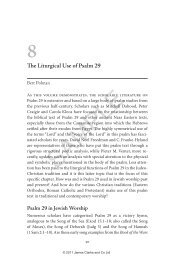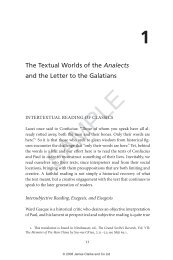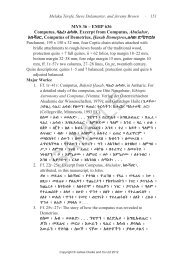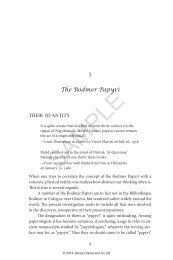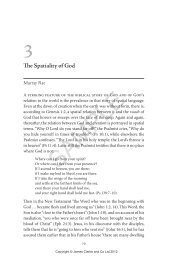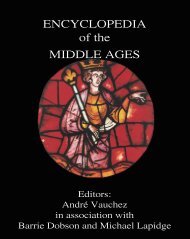Augustine's Conception of Deification, Revisited - James Clarke and ...
Augustine's Conception of Deification, Revisited - James Clarke and ...
Augustine's Conception of Deification, Revisited - James Clarke and ...
You also want an ePaper? Increase the reach of your titles
YUMPU automatically turns print PDFs into web optimized ePapers that Google loves.
Augustine’s <strong>Conception</strong> <strong>of</strong> <strong>Deification</strong>, <strong>Revisited</strong><br />
6 or Mainz 13. Augustine supplies an extended meditation in Dolbeau 6<br />
on a subject so seldom mentioned elsewhere. In what is a homiletic<br />
exposition <strong>of</strong> Psalm 81, he gives voice to a rich theological anthropology.<br />
In so doing, he connects the concept <strong>of</strong> a “deifying God” (deificatorem<br />
deum) to the soul’s spiritual warfare, the biblical vision <strong>of</strong> salvation history,<br />
<strong>and</strong> the gathering <strong>of</strong> members <strong>of</strong> the ecclesial “Body <strong>of</strong> Christ.”<br />
The Principal Passages<br />
Bonner cites only fifteen examples <strong>of</strong> the words DEIFICARI <strong>and</strong> DEIFICATUS<br />
(<strong>and</strong> seven <strong>of</strong> these, he argues, are “irrelevant” to the theology <strong>of</strong><br />
deification). Among the “relevant” passages he includes:<br />
Ep. 10.2: Augustine laments to his close childhood friend, Nebridius,<br />
that “amid uproar <strong>and</strong> restless comings <strong>and</strong> goings” a person cannot<br />
“achieve the familiarity with death that we are seeking. For in leisure . . .<br />
[one] would be permitted to become godlike” [in contemplation]. 3 This<br />
letter, written ca. 388–91, dates to the period after his conversion <strong>and</strong><br />
baptism, but before his ordination as a priest in Hippo. An echo <strong>of</strong> the<br />
youthful Augustine’s Neoplatonic yearning for the fulfillment <strong>of</strong> the<br />
philosophical life can be heard here.<br />
Enarrat. In Ps. 49.2: Here we find multiple references clustered<br />
together: (i) In reference to Psalm 81, he says, “It is quite obvious that<br />
God called human beings “gods” in the sense that they were deified by his<br />
grace, 4 not because they were born <strong>of</strong> his own substance.” (ii) “. . . . He<br />
alone deifies who is God <strong>of</strong> himself, not by participation in any other.” 5<br />
(iii) “Moreover he who justifies is the same as he who deifies, because by<br />
justifying us he made us sons <strong>and</strong> daughters <strong>of</strong> God . . .” (iv) “If we have<br />
been made children <strong>of</strong> God, we have been made into gods; but we are<br />
such by the grace <strong>of</strong> him who adopts us.” 6 This enarratio (explanation)<br />
SAMPLE<br />
3<br />
Letters 1–99. The Works <strong>of</strong> Saint Augustine: A Translation for the 21st Century, vol. II/1,<br />
tr. Rol<strong>and</strong> Teske, S.J. (Hyde Park, N.Y.: New City, 2001) 34.<br />
4<br />
My italics.<br />
5<br />
Bonner, “Augustine’s <strong>Conception</strong>,” 384.<br />
6<br />
Expositions <strong>of</strong> the Psalms (33–50). The Works <strong>of</strong> Saint Augustine (same series), vol. III/<br />
16, tr. Maria Boulding, O.S.B. (Hyde Park, N.Y.: New City, 2000) 381.<br />
123<br />
© 2010 <strong>James</strong> <strong>Clarke</strong> <strong>and</strong> Co Ltd



